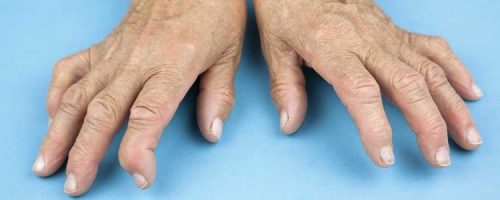- Home
- Editorial
- News
- Practice Guidelines
- Anesthesiology Guidelines
- Cancer Guidelines
- Cardiac Sciences Guidelines
- Critical Care Guidelines
- Dentistry Guidelines
- Dermatology Guidelines
- Diabetes and Endo Guidelines
- Diagnostics Guidelines
- ENT Guidelines
- Featured Practice Guidelines
- Gastroenterology Guidelines
- Geriatrics Guidelines
- Medicine Guidelines
- Nephrology Guidelines
- Neurosciences Guidelines
- Obs and Gynae Guidelines
- Ophthalmology Guidelines
- Orthopaedics Guidelines
- Paediatrics Guidelines
- Psychiatry Guidelines
- Pulmonology Guidelines
- Radiology Guidelines
- Surgery Guidelines
- Urology Guidelines
New medication guidelines for rheumatic disease patients having joint replacement

In the first such collaboration of its kind, an expert panel of rheumatologists and orthopedic surgeons has developed guidelines for the perioperative management of anti-rheumatic medication in patients undergoing total hip or knee replacement.
"Patients with rheumatic diseases who have joint replacement surgery are at increased risk for joint infection, a potentially devastating complication," said Susan Goodman, MD, co-principal investigator and a rheumatologist at Hospital for Special Surgery in New York City. "As infection risk is linked to the use of anti-rheumatic medication, our goal was to develop recommendations on when to stop medication prior to joint replacement and the optimal time for patients to restart treatment after surgery. Appropriate medication management in the perioperative period may provide an important opportunity to lower the risk of an infection or other adverse outcome."
The American College of Rheumatology (ACR) and the American Association of Hip and Knee Surgeons sponsored the project, and the guidelines were published in Arthritis Care & Research, a peer-reviewed medical journal of the ACR and the Association of Rheumatology Health Professionals. The recommendations are based on an extensive review of the available literature on the subject, clinical expertise and experience, and input from patients.
The expert panel consisted of 31 specialists from more than 20 hospitals and professional organizations. The medication guidelines concern adults with rheumatoid arthritis; spondyloarthritis, including ankylosing spondylitis and psoriatic arthritis; juvenile idiopathic arthritis; and lupus undergoing hip or knee replacement.
"Prior to our study, there was little to no consensus among orthopedic surgeons or rheumatologists on the optimal way to manage anti-rheumatic medication in patients having joint replacement surgery, and this often led to uncertainty in decision-making for physicians and patients alike," Dr. Goodman noted. "Our project brought together hip and knee replacement surgeons, rheumatologists and methodologists to determine optimal medical management through a group consensus process. In addition, a panel of 11 patients provided input on their preferences."
Investigators conducted a multi-step systematic literature review, screening thousands of articles. Evidence was compiled for continuing anti-rheumatic treatment versus withholding medication in the perioperative period. Researchers also sought to develop recommendations for optimal steroid management during this time.
The study included traditional disease-modifying anti-rheumatic drugs (DMARDs), biologic agents, tofacitinib, and glucocorticoids. The panel developed guidelines on when to continue, when to withhold, and when to restart these medications, as well as the optimal perioperative dosing of corticosteroids.
Among the main recommendations:
- Non-biologic DMARDs may be continued throughout the perioperative period in patients with rheumatoid arthritis, spondyloarthritis, juvenile idiopathic arthritis and lupus undergoing elective hip or knee replacement.
- Biologic medications should be withheld as close to one dosing cycle as scheduling permits prior to elective hip or knee replacement and restarted after evidence of wound healing, typically 14 days, for all patients with rheumatic diseases.
The patient panel, which had significant input, attached far greater importance to preventing infection at the time of surgery than to the possibility of a disease flare from stopping medication.
"The recommendations are intended for use by clinicians, including orthopedists, rheumatologists, and other physicians performing risk assessment and evaluation, as well as by patients," Dr. Goodman noted. "Communication is key. It is imperative that open and informed communication between the patient, orthopedic surgeon and rheumatologist take place."
The panel noted that the guidelines address common clinical situations, but may not apply in exceptional or unusual situations. While cost is a relevant factor in healthcare decisions, it was not considered in this project.

Disclaimer: This site is primarily intended for healthcare professionals. Any content/information on this website does not replace the advice of medical and/or health professionals and should not be construed as medical/diagnostic advice/endorsement or prescription. Use of this site is subject to our terms of use, privacy policy, advertisement policy. © 2020 Minerva Medical Treatment Pvt Ltd